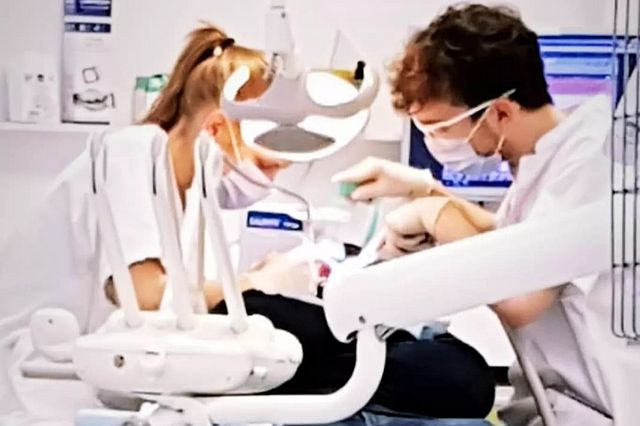Tooth Decay, Lockdown and New Best Friends: the Life of a Dentistry Erasmus Student at UW/H
Tooth Decay, Lockdown and New Best Friends: the Life of a Dentistry Erasmus Student at UW/H
In this interview, Guewen Morin, an Erasmus+ dentistry student from France, tells us about his experience studying in Witten during Corona, the differences between French and German approaches to dentistry, why he decided to do his PhD research at UW/H and that he was surprised that “that the Ruhr region isn’t only factories everywhere”.
With the Erasmus programme you can go to many different countries in Europe and beyond. Why did you decide to come to Germany? Why Witten/Herdecke University? Did you know or hear anything about Witten before?
To be honest, my home university doesn’t offer many choices. The 3 destinations are : Germany, Spain and Scotland. It can seem strange that there are only these three, but studying in a medical field doesn’t allow us to go to just any university. As we need a lot of practice, and the recognition of the semester, the sending and the receiving university have to work together, and have the same way of organizing the course of studies.
My mother being German, I wanted to spend some time in Germany. Speaking German fluently, also made it way easier to communicate with patients. A friend of mine went to Witten for his Erasmus and really enjoyed it. He told me, that the University was not too big, had great teachers, an international spirit, and a modern, open-minded approach of dentistry: that’s why I came here!
Despite the uncertain situation due to the pandemic, you decided to go on Erasmus. Which personal and academic challenges and opportunities did you encounter?
I wasn’t sure to be able to come until August, which was really stressful, I didn’t know if I had to prepare to move, to find an apartment in Witten etc… I decided to take it easy and to just let it happen. It worked out!
I passed my last, most important exam in France (the equivalent of the German “Staatsexamen”), a few months before leaving, so the lectures weren’t mandatory for me. I was able to follow the ones I was most interested in, which was really great!
The most important was the practice part, and the contact with patients. The objective was to see and do as much as possible. I was able to see a lot of therapeutic alternatives to the French ways of treating oral issues, it really enlarged my field of knowledge, and even now, working in a dental clinic, I really often think about the German ways of doing things and my time in Witten.
What is it like to be an Erasmus student in Witten? Even though the situation has been quite challenging, did you still get an “Erasmus feeling?” What makes your Erasmus experience in Witten special?
I would say the first weeks were normal: meeting with Germans, with international students, going to bars, restaurants, visiting the surrounding cities… and then came the lockdown. Having been able to bond with the other Erasmus students allowed it to keep a link, virtual or in small groups outside, we managed to keep in touch. The social aspect of the Erasmus was a bit affected though.I was still able to continue working all the time, so I saw patients, worked with students here, assisted some professors, it was great. So, even if I worked less than usual, I was still able to continue in the study field.
I met awesome people in this Erasmus group, we built exceptional relationships and when I think of what made my Erasmus so awesome now, I think of them.
Witten itself, was a really good surprise. The city was small enough to know it well after a few weeks, the nature surrounding also allowed to have nice walks. It’s probably not the usual “Erasmus feeling”, in a big crowded student city, but it was really worth it, for sure.
What is different in Witten than at your home university? Why would you recommend other dentistry students to go on Erasmus in Witten?
I feel like the teaching is more personalized in Witten, the groups are small, the teachers are always attentive to everyone. Every step of every therapeutic process is checked. There is a real link made between the theoretical and the practical knowledge, what maybe lacks a bit in my home university.
The clinic is really modern, has its own dental technicians, who make the prosthetics, has many departments: for disabled people, for conservative odontology, periodontology, prosthetics, surgery, etc… There are a lot of possibilities to learn new stuff!
You have decided to cooperate for your PhD with UW/H? Tell us more about it. What made you cooperate and what is it about?
I lead a study in Germany about “knowledge and expectations of patients about the treatment of tooth decay / Caries disease”. The study has already been made in France.
The medical system and the way Germans consider dental health seems very different, so I thought it would be a great idea to see if there is a difference. The patients who come for this kind of issue to the university clinic, have to answer a few questions about this topic. Once the results will have been collected, I’ll be able to compare them.
The heads of the university here, and the professor leading my doctoral thesis in France, were immediately interested in the idea and helped a lot. It was a long process to have the allowance of the Ethic Commission of the university, but everyone was really helpful and it finally worked! The study is still running. I hope to be able to finish it soon and to work on the analysis of the data.
What do you wish you knew about going to Witten for your Erasmus in your field of study before you came here?
There is not a lot, really. The Erasmus office did a great communication job, was always answering really quickly and really helpful.
Maybe I would have liked to know that the Ruhr region isn’t only factories everywhere like I expected. But a big part of an Erasmus is the surprise effect, so actually it was also nice to discover this part of Germany, which I now kind of miss.
Any further thoughts?
I really want to thank everyone who made my Erasmus unique: the Erasmus students, the Erasmus team, my roommate, the Germans I met, and especially everyone in the dentistry department of the university. The biggest of thanks to all the students still working to help me get the most forms filled for my study.
Thank you Guewen for your answers! Do you now also want to go abroad? Contact us: international-office@uni-wh.de to find out what opportunities we have for students and staff to study and work abroad!
Article written by Ramona Szymczak, Student Assistant, International Office.
Overview
Die Universität Witten/Herdecke ist durch das NRW-Wissenschaftsministerium staatlich anerkannt und wird – sowohl als Institution wie auch für ihre einzelnen Studiengänge – regelmäßig akkreditiert durch:







